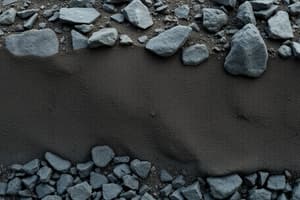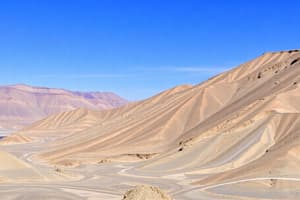Podcast
Questions and Answers
Which year had the highest shortage percentage recorded?
Which year had the highest shortage percentage recorded?
- 1997 (correct)
- 1993
- 1991
- 1996
What was the shortage percentage in 1994?
What was the shortage percentage in 1994?
7.4
The energy consumption for families in the neighborhood has decreased in the last five years.
The energy consumption for families in the neighborhood has decreased in the last five years.
False (B)
In 1996, the shortage percentage was _____%
In 1996, the shortage percentage was _____%
Name one type of energy mentioned that families might consume.
Name one type of energy mentioned that families might consume.
What are the advantages of using CNG and LPG as fuels?
What are the advantages of using CNG and LPG as fuels?
Name the petroleum product used for surfacing of roads.
Name the petroleum product used for surfacing of roads.
Describe how coal is formed from dead vegetation. What is this process called?
Describe how coal is formed from dead vegetation. What is this process called?
Fossil fuels are ______, ______, and ______.
Fossil fuels are ______, ______, and ______.
The process of separation of different constituents from petroleum is called ______.
The process of separation of different constituents from petroleum is called ______.
The least polluting fuel for vehicles is ______.
The least polluting fuel for vehicles is ______.
Fossil fuels can be made in the laboratory.
Fossil fuels can be made in the laboratory.
CNG is a more polluting fuel than petrol.
CNG is a more polluting fuel than petrol.
Coke is an almost pure form of carbon.
Coke is an almost pure form of carbon.
Coal tar is a mixture of various substances.
Coal tar is a mixture of various substances.
Kerosene is not a fossil fuel.
Kerosene is not a fossil fuel.
Explain why fossil fuels are exhaustible natural resources.
Explain why fossil fuels are exhaustible natural resources.
Describe the characteristics and uses of coke.
Describe the characteristics and uses of coke.
Explain the process of formation of petroleum.
Explain the process of formation of petroleum.
Flashcards are hidden until you start studying
Study Notes
Energy Shortages in India
- Significant power shortage recorded in India from 1991 to 1997, peaking at 11.5% in 1997.
- Detailed shortage percentages:
- 1991: 7.9%
- 1992: 7.8%
- 1993: 8.3%
- 1994: 7.4%
- 1995: 7.1%
- 1996: 9.2%
- 1997: 11.5%
Natural Resources Classification
- Natural resources are categorized into two types:
- Inexhaustible Natural Resources: Unlimited in quantity (e.g., sunlight, air).
- Exhaustible Natural Resources: Limited in quantity and susceptible to depletion (e.g., forests, coal, petroleum, natural gas).
Coal
- Hard, black fossil fuel used historically for cooking and in steam engines; essential for thermal power generation.
- Formed through the carbonisation process from dead vegetation buried under soil over millions of years.
- Processed to produce useful products:
- Coke: Pure carbon used in steel manufacturing.
- Coal Tar: Thick liquid with applications in dyes, drugs, explosives, and moth repellents.
- Coal Gas: Historically used for street lighting; now a significant industrial fuel.
Petroleum and Natural Gas
- Petroleum: Derives from ancient marine organisms; major source of fuels like petrol and diesel.
- First oil well drilled in Pennsylvania in 1859.
- Found in regions like Assam, Gujarat, and the Godavari and Krishna river basins in India.
- Refining of Petroleum: Complex process separating various constituents, yielding several products, including:
- LPG for home and industrial fuel.
- Kerosene for lamps and jet fuel.
- Bitumen for road surfacing.
Natural Gas
- Cleaner fossil fuel, easily transportable via pipelines; compressed natural gas (CNG) is a significant alternative for vehicles due to lower pollution.
- Plays a crucial role in the manufacturing of chemicals and fertilizers.
- Reserves located in Tripura, Rajasthan, and Maharashtra.
Environmental Concerns
- Burning fossil fuels results in air pollution and contributes to global warming.
- Conservation measures recommended by the Petroleum Conservation Research Association (PCRA) include:
- Driving at steady speeds
- Turning off engines during stops
- Maintaining proper tyre pressures
- Regular vehicle maintenance
Key Takeaways
- Fossil Fuels: Coal, petroleum, and natural gas are classified as fossil fuels formed from decomposed organic matter over millennia.
- Exhaustibility: These resources are limited and require judicious use to maintain availability for future generations.
- Product Uses: Multiple products derived from coal and petroleum play crucial roles in everyday life and various industrial applications.
Studying That Suits You
Use AI to generate personalized quizzes and flashcards to suit your learning preferences.




